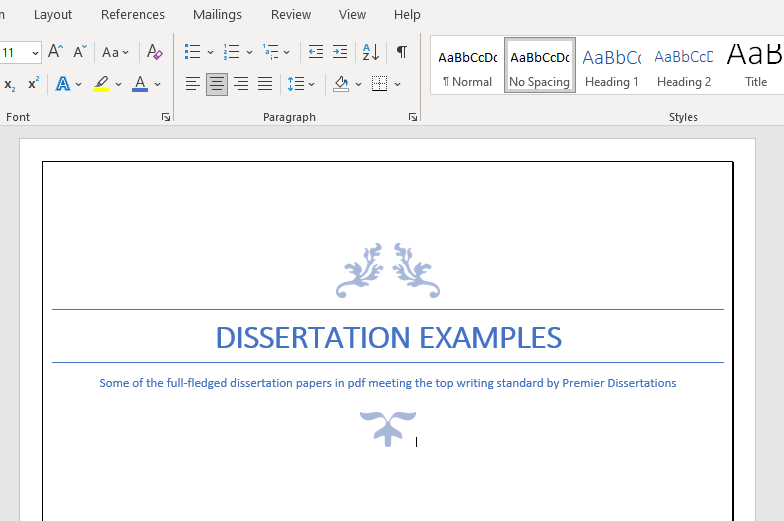
A Comprehensive Guide to Crafting an Effective Literature Review Template
May 19, 2023
Crafting an Engaging Dissertation Introduction Template: A Comprehensive Guide
May 19, 2023Creating a dissertation template is a difficult task for your writing process. It requires careful planning and organisation.
One of the crucial steps in this process is creating a complete and effective dissertation plan template.
Review Our Quality Dissertation Examples
Get 3+ Free Dissertation Topics within 24 Hours
In this blog post, we will provide you with a step-by-step guide and a ready-to-use template to help you structure your dissertation plan efficiently.
Example 1: Effects of Virus on Hospitality and Tourism
Example 2: Impact of Leadership Style on Professional Satisfaction of Nurses: A Case Study
Note: Below is a complete guide with a template for you to ace the skill of dissertation writing.
Understanding the Importance of a Dissertation Plan Template
A dissertation planning template serves as a roadmap for your research journey, helping you stay focused and on track throughout the entire process. It acts as a blueprint, outlining the key elements of your study and providing a clear direction for your research.
How to Write a Unique Dissertation Title: Tips and Examples
A well-crafted plan enables you to manage your time effectively, allocate resources efficiently, and ensure you cover all your dissertation's essential aspects.
Key Components of a Dissertation Plan
Writing a dissertation requires a clear understanding of what to write and which points are of the most importance. It also requires strong organisational skills to keep track of all the research and maintain focus on the main topic. Additionally, it is important to be able to communicate the research clearly and concisely in order to convey its message effectively.
A Step-by-Step Guide to Dissertation Data Analysis
- Research Question: Start by clearly defining your research question or objective. This forms the core of your dissertation and will guide your entire study.
- Literature Review: Conduct a thorough review of existing literature related to your research topic. The dissertation planner template will provide a foundation for your study and help you identify research gaps.
- Methodology: Describe the research methods you intend to use and explain why they are appropriate for your study. Include details on data collection, sampling, and analysis techniques.
- Timeline: Create a timeline outlining the different stages of your dissertation, including research, data collection, analysis, writing, and editing. Be realistic with your deadlines and allow room for unexpected delays.
How to Prepare Dissertation Project Plan Template
A good template will help you keep track of your progress and ensure that you stay on track. It will also help you plan and structure your dissertation in an organised manner. Additionally, it will make the writing process easier and more efficient.
Step 1: Start Early: Begin working on your dissertation plan well in advance. Give yourself ample time to research and refine your ideas. Early planning will help you avoid last-minute stress and ensure a smoother writing process.
Step 2: Define Your Research Question: Formulate a clear and concise research question that aligns with your interests and expertise. Seek guidance from your supervisor or academic mentors if needed.
Expert Tips on How to Write a Research Question with Real Examples
Step 3: Conduct a Thorough Literature Review: Dive into existing research and scholarly articles relevant to your topic. Take notes, highlight key findings, and identify any gaps or areas where you can contribute new insights.
Step 4: Determine Your Methodology: Choose the appropriate research methods for your study, such as surveys, interviews, experiments, or data analysis. Justify your choice based on the nature of your research question and the availability of resources.
A Quick Guide on How to Write the Methods Section in Academic Writing
Step 5: Create a Timeline: The dissertation time plan template is the most helpful way to manage your tasks and create a realistic timeline. Consider factors such as data collection, analysis, writing, and revisions. Set deadlines for each stage and allow for flexibility.
Step 6: Seek Feedback: Share your dissertation plan with your supervisor or mentors and seek their input. They can provide valuable suggestions and help refine your research approach or identify potential issues.
Step 7: Revise and Update: As your research progresses, be prepared to revise and update your dissertation plan. Adaptations may be necessary as new insights emerge or challenges arise.
Follow A Dissertation Plan Template for Effective Writing
Here is a simple template to help you structure your dissertation plan:
Introduction
Research question/objective
Importance of the study
Literature Review
Key theories and concepts
Previous research findings
Methodology
Research design
Data collection methods
Data analysis techniques
Timeline
Research activities and milestones
Deadlines for each stage
Conclusion
Summary of the plan
Anticipated outcomes
Final Thought
Crafting a complete dissertation plan is crucial to successfully completing your dissertation. Remember, a well-thought-out plan helps you stay focused and allows you to manage your time efficiently. It provides a clear roadmap for your research journey and helps you anticipate any challenges or obstacles that may arise along the way.
So, don't underestimate the power of a dissertation plan template. Take the time to carefully consider each section, seek guidance when needed, and be prepared to adapt as you progress with your research. With a solid plan in place, you'll have the confidence and direction necessary to tackle your dissertation head-on.
Get 3+ Free Dissertation Topics within 24 hours?














